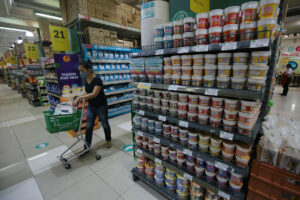Supermarkets see goods not subject to price controls becoming more expensive

SUPERMARKETS said prices are rising for goods not subject to government price ceilings.
Steven T. Cua, Philippine Amalgamated Supermarkets Association, Inc. president, said such price behavior has been observed in grocery items not covered by the suggested retail price scheme.
“Prices continue to surge for (grocery) items not monitored by the Department of Trade and Industry (DTI). These products belong to all categories especially if imported, repacked, or re-canned but manufactured abroad such as bread spreads and luncheon meat,” Mr. Cua told BusinessWorld via mobile phone.
“(The) increases would range from 5% to 10% for local goods and 12% to 25% for imported items during the last few months. This is due to the cost of bringing in imported raw materials, intermediate goods which need repacking or processing, and finished goods,” he added.
Under Republic Act No. 7581 or the Price Act, the DTI issues suggested retail prices (SRPs) for basic necessities and prime commodities that it monitors.
The DTI defines basic necessities as products deemed important to the needs of consumers for their sustenance, while prime commodities are products not considered basic necessities but otherwise deemed essential.
Some of the basic necessities covered by the DTI include bread, canned fish, detergent, processed milk, and locally manufactured instant noodles, while prime commodities include flour, toilet soap, vinegar, and soy sauce.
The latest SRP bulletin was issued in May, which reflected price increases ranging from 2% to 10% for 82 stock keeping units (SKUs) such as bread and coffee, while 136 SKU prices were maintained.
On July 12, the DTI said that the current price hike petitions by makers of canned meat, coffee, bread, and detergent are in the final review stages and may take a few more weeks before obtaining approval.
It added that the proposed price increases were caused by rising input costs, which are thus far being absorbed by manufacturers.
“It could take us probably a couple of weeks for us to complete and submit our recommendation for approval, and another couple of weeks probably for the Secretary to approve and for us to (move to) publication,” Trade Undersecretary Ruth B. Castelo said.
Meanwhile, Mr. Cua said foot traffic in supermarkets has increased despite the new surge in coronavirus disease 2019 (COVID-19) cases.
“There is a need for continuous urging of the population to get their COVID-19 booster shots,” Mr. Cua added.
On Saturday, the Health department announced that there were 2,578 new COVID-19 cases, bringing the country’s case count to 3,730,545. — Revin Mikhael D. Ochave




